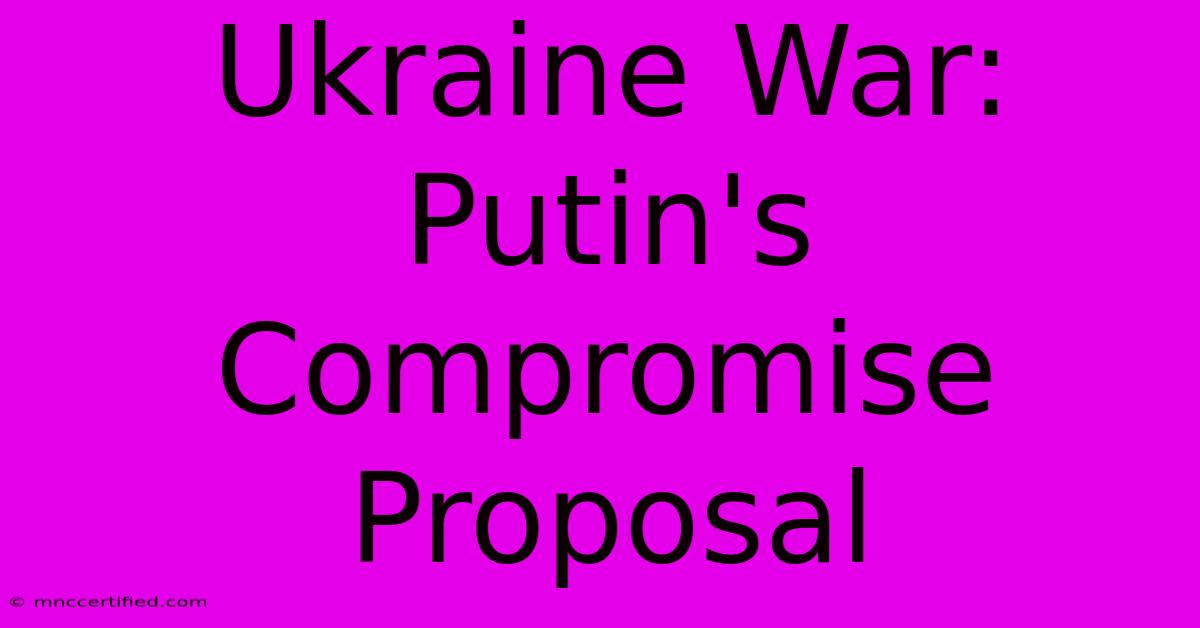Ukraine War: Putin's Compromise Proposal

Table of Contents
Ukraine War: Putin's Compromise Proposal – A Path to Peace or a Trojan Horse?
The ongoing conflict in Ukraine has captivated global attention, leaving the world desperately seeking pathways to peace. Recently, Russia, under President Vladimir Putin, has floated several proposals framed as "compromises." However, understanding the true nature of these proposals requires careful scrutiny, separating genuine attempts at de-escalation from potential strategic maneuvers. This article will analyze Putin's purported compromise proposals, examining their potential implications for Ukraine, Russia, and the international community.
Understanding the Context: Russia's Objectives and Ukraine's Red Lines
Before delving into the specifics of any proposed compromises, it's crucial to understand the underlying objectives driving both sides. Russia's stated goals have evolved throughout the conflict, ranging from "denazification" and "demilitarization" of Ukraine to securing territorial gains and preventing NATO expansion. Ukraine, however, maintains its unwavering commitment to sovereignty and territorial integrity, refusing to cede any land or compromise on its self-determination. This fundamental difference in objectives creates a significant hurdle in achieving any meaningful compromise.
Key Elements of Putin's Proposed "Compromises"
While specific proposals have varied over time, several recurring themes emerge in Putin's rhetoric concerning a potential resolution:
-
Neutral Status for Ukraine: This consistently features prominently, demanding Ukraine forswear any future NATO membership and maintain a non-aligned stance. This is viewed by Russia as a crucial security guarantee, preventing the perceived threat of NATO encroachment on its borders.
-
Territorial Concessions: Proposals concerning territorial concessions are more fluid and often depend on the current battlefield situation. However, the underlying theme involves Ukraine potentially relinquishing some of the territories currently occupied by Russian forces, including Crimea and parts of eastern Ukraine. This is a non-starter for many Ukrainians.
-
Security Guarantees for Russia: Russia has consistently demanded security guarantees from the international community, ensuring its perceived security concerns are addressed. This is often linked to limitations on NATO's military activities near Russian borders.
-
Recognition of "New Realities": This ambiguous phrase refers to the acceptance of Russia's annexation of Crimea and the establishment of pro-Russian separatist entities in eastern Ukraine. For Ukraine, this represents an unacceptable violation of its sovereignty and territorial integrity.
Analyzing the Proposals: Genuine Peace or Strategic Maneuver?
The true intentions behind Putin's proposed "compromises" remain debatable. Some argue these represent genuine attempts at negotiating a peaceful settlement, albeit from a position of considerable military advantage. Others view them as strategic maneuvers aimed at consolidating Russian gains, legitimizing its occupation of Ukrainian territory, and weakening Ukraine's long-term prospects.
Potential Implications:
-
For Ukraine: Accepting any compromise involving territorial concessions or a neutral status could be perceived as a betrayal of national interests and a surrender to Russian aggression. This could also lead to internal instability and potentially further conflict.
-
For Russia: Failure to secure a favorable outcome could embolden Ukraine and its allies, leading to a protracted conflict with potentially severe consequences for Russia's economy and international standing.
-
For the International Community: The failure of diplomatic efforts could escalate tensions further, potentially leading to a wider conflict. Moreover, any perceived appeasement of Russia could set a dangerous precedent for future conflicts.
Conclusion: The Path Forward
Achieving a lasting and just peace in Ukraine requires a multifaceted approach. It necessitates a strong commitment to international law, upholding Ukraine's sovereignty, and addressing the underlying security concerns of all parties. While exploring potential compromises is crucial, any negotiated settlement must not reward aggression or compromise Ukraine's fundamental right to self-determination. The international community must work collaboratively to ensure any "compromise" truly leads to a durable peace, not a temporary truce that leaves the seeds of future conflict sown. The road to peace is complex and challenging, demanding careful consideration, strategic diplomacy, and unwavering support for Ukraine's sovereignty.

Thank you for visiting our website wich cover about Ukraine War: Putin's Compromise Proposal. We hope the information provided has been useful to you. Feel free to contact us if you have any questions or need further assistance. See you next time and dont miss to bookmark.
Featured Posts
-
Knicks Towns Gets Minnesota Welcome
Dec 20, 2024
-
Prime Video Beast Games Release
Dec 20, 2024
-
Penn State Louisville Ncaa Volleyball Final
Dec 20, 2024
-
Cubs Reunion Sosa Apologizes For Past
Dec 20, 2024
-
Amazon Faces Worker Strike This Holiday
Dec 20, 2024